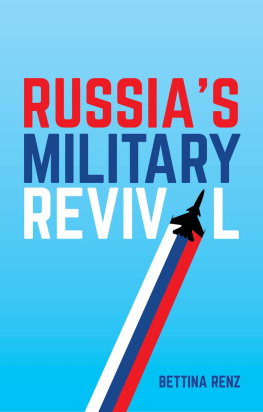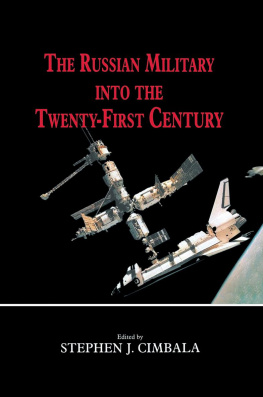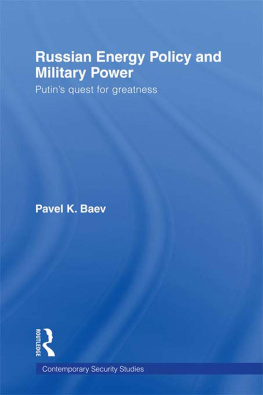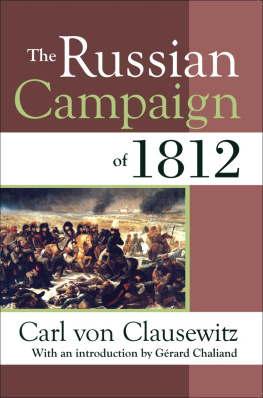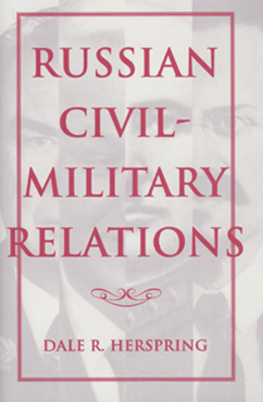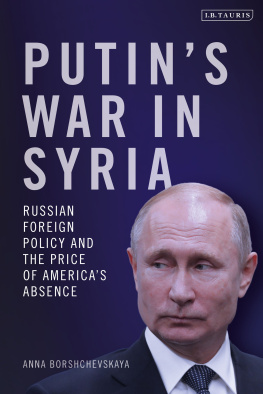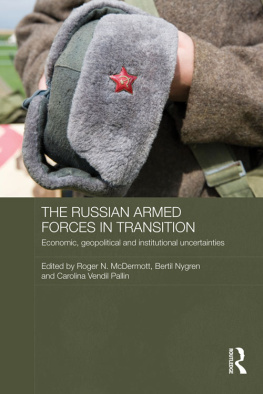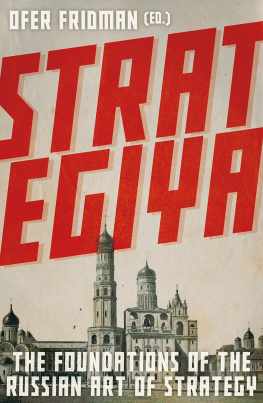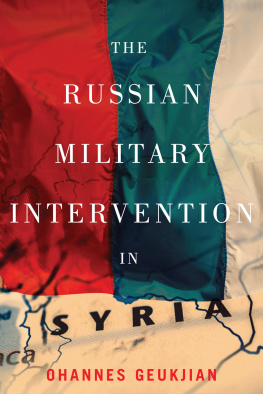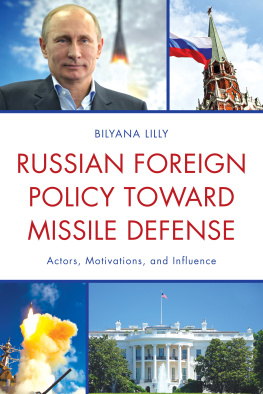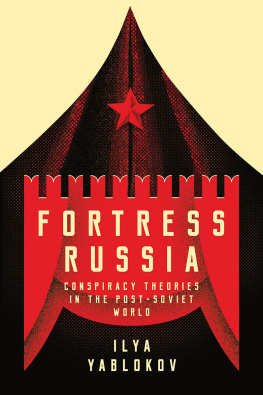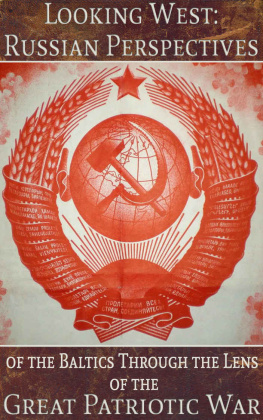Contents
Guide
Pages

Russias Military Revival
Bettina Renz
polity
Copyright Bettina Renz 2018
The right of Bettina Renz to be identified as Author of this Work has been asserted in accordance with the UK Copyright, Designs and Patents Act 1988.
First published in 2018 by Polity Press
Polity Press
65 Bridge Street
Cambridge CB2 1UR, UK
Polity Press
101 Station Landing
Suite 300
Medford, MA 02155, USA
All rights reserved. Except for the quotation of short passages for the purpose of criticism and review, no part of this publication may be reproduced, stored in a retrieval system or transmitted, in any form or by any means, electronic, mechanical, photocopying, recording or otherwise, without the prior permission of the publisher.
ISBN-13: 978-1-5095-1618-6
A catalogue record for this book is available from the British Library.
The publisher has used its best endeavours to ensure that the URLs for external websites referred to in this book are correct and active at the time of going to press. However, the publisher has no responsibility for the websites and can make no guarantee that a site will remain live or that the content is or will remain appropriate.
Every effort has been made to trace all copyright holders, but if any have been inadvertently overlooked the publisher will be pleased to include any necessary credits in any subsequent reprint or edition.
For further information on Polity, visit our website:
politybooks.com
Acknowledgements
Part of the research and writing for this book was completed during a project funded by the Finnish Prime Ministers Office, Governments Analysis, Assessments and Research Activities fund from October 2015 until July 2016. I would like to thank the fund for the generous support. The project, entitled Russian hybrid warfare, was conducted jointly with Hanna Smith at the University of Helsinkis Aleksanteri Institute. Hanna also contributed with her expertise on Russian foreign policy and history to the first chapter of this book. I would like to thank Hanna for her invaluable input, our epic discussions and for her friendship throughout the years. For six months of the project I was based at the Aleksanteri Institute as a senior researcher and I benefited greatly from the positive atmosphere and from the space to think and write that the institute offers to its scholars. I am grateful to everybody there for their ongoing support and friendship. I would like to thank the projects panel of experts for their vital input and for the time they spent with us in Helsinki: Tor Bukkvoll, Samuel Charap, Antulio J. Echevarria II, Keir Giles, Sibylle Scheipers, Hew Strachan and Rod Thornton. Thanks also go to Mikko Lappalainen for his involvement and support.
I am extremely grateful to Louise Knight and Nekane Tanaka Galdos at Polity for their wonderful support, advice and patience throughout the process of writing this book. Both went above and beyond to ensure that the project would come to fruition. I could not have wished for better editors and the book would not have been possible without you! I would like to thank Edwin Bacon, Lance Davies, Matthew Rendall, Rod Thornton, Hanna Smith, Jeremy Smith and Aaron Bateman for reading and offering valuable comments on various parts and chapters of the book. I am also grateful for the constructive criticism and helpful suggestions by the anonymous readers of the manuscript.
Thanks are due to many other people, who are too numerous to list here. I greatly appreciate the time given by the interviewees in Moscow to meet and discuss the subject in spring 2016 and to the many Russian scholars, analysts, journalists, politicians and officials that agreed to speak to me over the years. They all, without exception, have shaped and informed my understanding of Russian politics and military affairs. I would also like to thank all my wonderful colleagues and friends at the University of Nottinghams School of Politics & International Relations. Their support has been vital, especially during the final months of completing the book. I continue to be grateful to everybody, past and present, at the University of Birminghams Centre for Russian and East European Studies, my intellectual home. Long may it continue! Special thanks go to Edwin Bacon, Julian Cooper, Sarah Whitmore, Mary Buckley, Alex Danchev and Vivien Lowndes, all of whom have been hugely supportive of me and my work. I would not have got here without you.
Finally, my thanks and love go to Jason Curteis and to my parents, Karl-Dieter and Marlene Renz. My parents have always believed in what I am doing and given me tireless encouragement and support, so I would like to dedicate this book to them.
Introduction
Mr President, acting on your decision, since the 30th, we have been carrying out missions to strike ISIS, Jabhat al-Nusra, and other terrorist groups present on Syrian territory. Since September 30, we have conducted strikes against 112 targets. We are increasing our strikes intensiveness. Our various intelligence and reconnaissance forces have been working intensively over these last two days and have identified a large number of ISIS targets: command posts, ammunition depots, military hardware, and training camps for their fighters. Vessels from our Caspian Fleet joined our aviation in attacking these targets this morning. Four warships launched 26 Kalibr cruise missiles against 11 targets. Our target monitoring data shows that all targets were destroyed and civilian facilities were not damaged in the strikes. These strikes results demonstrate the high effectiveness of our missiles launched from a big distance of nearly 1,500 kilometres. This morning, 23 attack aircraft also continued their strikes against insurgent positions. Since September 30, we have destroyed 19 command posts, 12 ammunition depots, 71 pieces of military hardware, and six explosives production workshops producing explosives for car bombs and so on. We are continuing our operations according to plan.
These are the words of the Russian Defence Minister, Sergei Shoigu, reporting to the Commander-in-Chief of the Russian Armed Forces, President Vladimir Putin, exactly one week after Russias air campaign over Syria was launched on 30 September 2015 (Shoigu 2015). Only ten years prior to this report, such an account of Russian military activities would have appeared like nothing but fiction. Throughout much of the 1990s and 2000s, the Russian armed forces had been left to fall into a state of serious disrepair. As Russia entered the new millennium it appeared clear, as Eugene Rumer and Celeste Wallander wrote that it did so with its capacity to project power beyond its borders vastly reduced and its ability to defend its territorial integrity and sovereignty severely tested (2003: 61). By the middle of the 2000s, many believed, both in Russia and in the West, that the ongoing neglect of the Russian armed forces had pushed them close to irreversible ruin. Given that their service personnel were by now impoverished, demoralized and largely ineffective (Barany 2005: 33) and the forces woefully inadequate to address the countrys security threats (Golts and Putnam 2004: 121), it seemed clear that Russia no longer cast the shadow of a global military power.
Against this background Russia has experienced a remarkable military revival within barely more than a decade. The operations in Syria demonstrated that many of the shortcomings, which had led to humiliating defeat in the first Chechen War and to operational problems in other conflicts, had been decisively overcome. One year into the Syria intervention in autumn 2016, Russian forces had experienced minimal losses, both in the air and on the ground. Moscow had put on display new capabilities, such as vastly improved command and control and inter-service coordination, as well as advanced technologies like precision-guided munitions, including cruise missiles fired from the Caspian and Mediterranean seas. What came, perhaps, as the biggest surprise to many observers was that Russia now had the sealift and airlift capabilities required to launch military operations far beyond its immediate neighbourhood (Gorenburg 2016). As such, in Ruslan Pukhovs words, Russias air operations over Syria represented the most spectacular military-political event of our time (2016).

